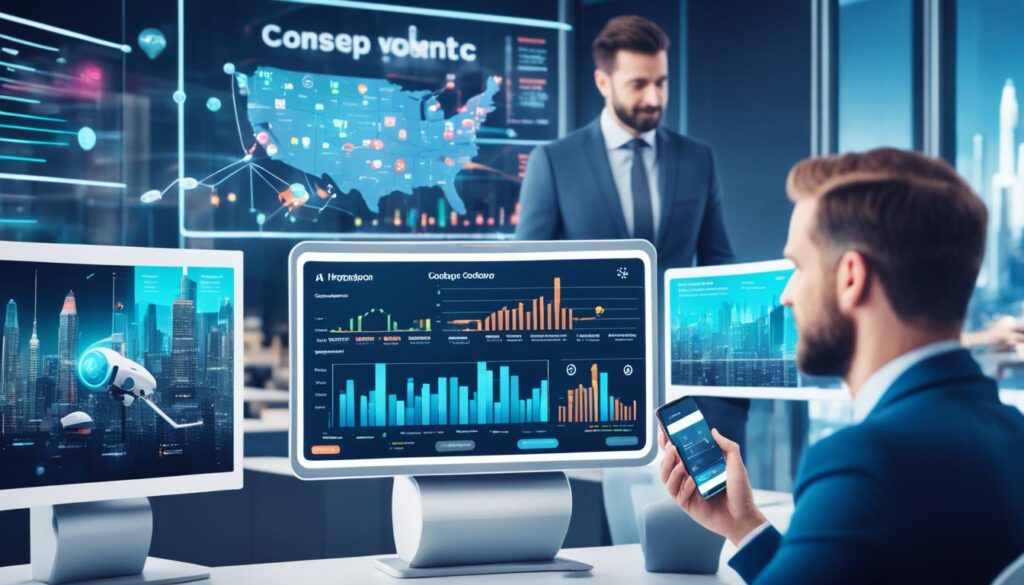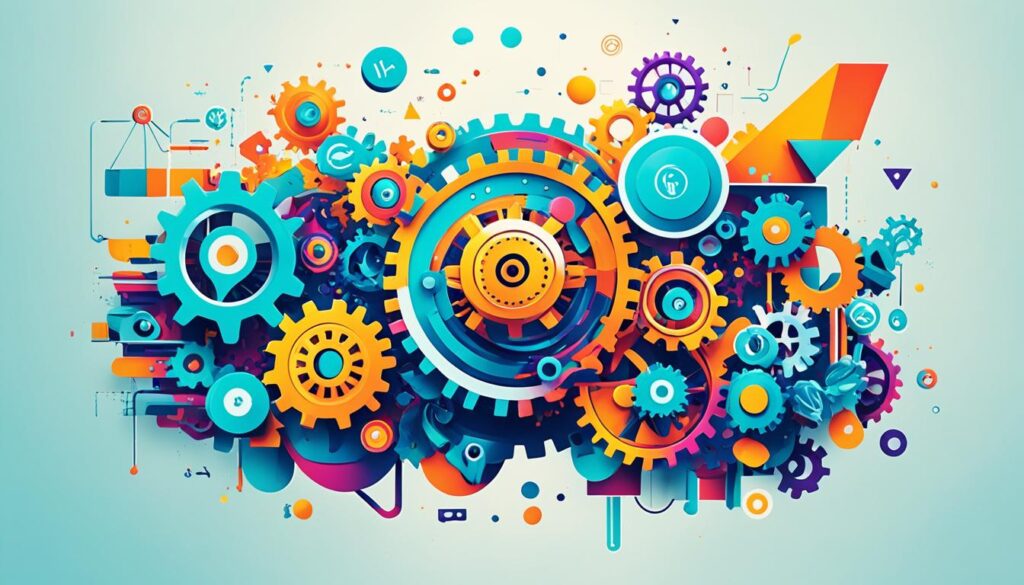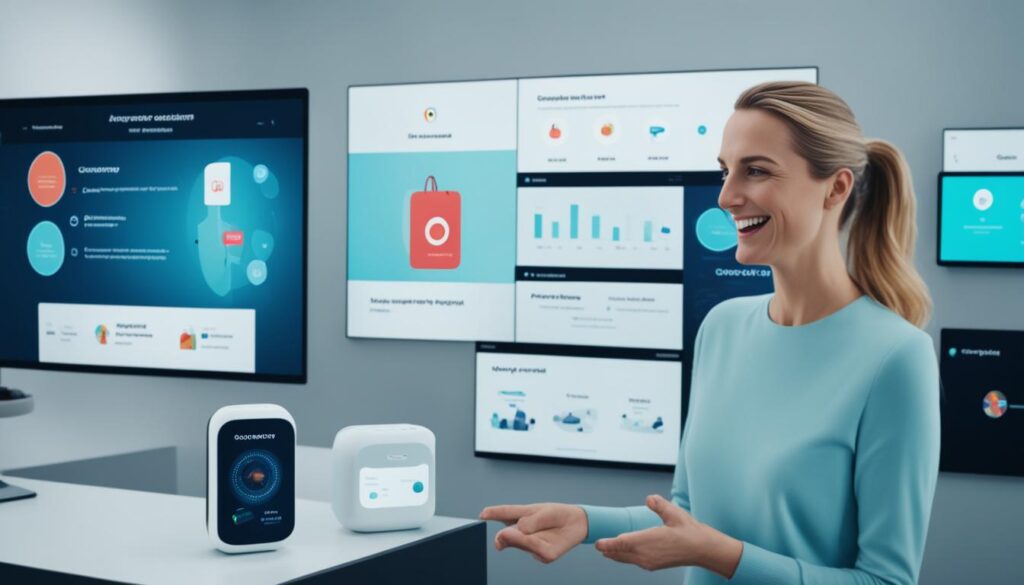“The future belongs to those who believe in the beauty of their dreams.” – Eleanor Roosevelt
In marketing, using artificial intelligence (AI) brings dreams to life. Now, 85% of marketers are learning more about AI for marketing automation. This shows AI is a must-have today, not just a future idea. It changes how campaigns are run and makes customer experiences very personal. The main goal is to look at how AI outperforms regular automation by adapting and using data smartly.
AI does amazing things like predictive analytics and always-on chatbots. This means processes get streamlined, we learn more from data, and brands stand out more. Since 70% of companies see AI as a key to doing better, it’s clear AI is essential. By using AI in marketing, tactics get sharper, customer groups are understood better, and interest is kept up constantly.
Key Takeaways
- 85% of marketers are updating their skills to leverage AI for marketing automation.
- AI-powered chatbots offer 24/7 customer engagement, reducing response times.
- Companies using AI technologies can achieve an ROI increase of up to 30%.
- AI tools help create personalized experiences, improving email open rates by 26% and click-through rates by 41%.
- Predictive analytics using AI can forecast trends and optimize marketing outcomes.
Understanding AI and Marketing Automation
Marketing automation with AI has become key for businesses to improve their operations and make customer experiences more personal. This combination of artificial intelligence and automation opens new possibilities. It lets companies analyze data, engage customers, and manage campaigns like never before.
Definitions and Differences
Artificial intelligence in marketing means using advanced computer systems. These systems can learn, reason, and solve problems to automate complex tasks. They help businesses understand customer behaviors, personalize interactions, and predict future actions. On the other hand, traditional marketing automation does simpler tasks without needing much human help, like scheduling emails or sending messages when customers take certain actions.
Historical Context and Evolution
Initially, marketing automation could only do basic tasks like sending emails or managing contacts. But the introduction of AI has completely changed the field. Now, instead of just repeating tasks, AI in marketing can run complicated campaigns across multiple channels and offer advice on the best action to take in real time. This growth shows a move from simple automation to a detailed, AI-enhanced way of marketing, making strategies more adaptive and proactive.
For example, Optimove’s CRM Marketing Platform uses AI to manage messages across different channels and make personalization better. Marketers are encouraged to use these advanced tools for custom campaigns. This way, they can stay ahead in today’s competitive market.
| Statistic | Detail |
|---|---|
| Global AI Market Size 2023 | $164.99 Billion |
| Industrial Robots in Use Worldwide (2022) | Over 4 Million |
| Manufacturing Jobs in the US Projected to Be Lost by 2030 | 20 Million |
| New Jobs Created by Automation | Approximately 133 Million |
| AI Impact on UK Jobs (2017-2037) | 7.2 Million New Jobs Created, 7 Million Displaced |
The Benefits of Using AI in Marketing Automation
Artificial Intelligence (AI) has grown fast, touching many industries, especially online marketing and advertising. We see AI’s value in automation across three main areas: improved efficiency, data-driven insights, and personalized marketing. These dimensions transform how businesses interact with customers.
Enhanced Efficiency
AI boosts efficiency in marketing by taking over repetitive tasks. This change lets marketers focus on big-picture strategies. It helps team members prioritize tasks and time more effectively by spotting the best leads. AI-driven marketing enables a high degree of personalization, keeping track of customer interactions and maintaining a uniform marketing strategy.
Data-Driven Insights
With AI, companies can dive into massive amounts of data. AI examines trends and connections to forecast future behaviors, offering insights from in-depth customer data analysis. This approach pushes AI marketing forward. It lets marketers reach the right people with messages that resonate at the perfect time. AI analytics refine marketing plans, boosting customer engagement and loyalty.
https://www.youtube.com/watch?v=uRnd_1R-xzY
Automated Personalization
AI shines in delivering custom experiences to many customers at once. It strengthens the bond between businesses and clients, providing immediate insights into consumer behaviors. By understanding how audiences interact, AI predicts what they might like next, tailoring experiences to each customer. AI saves marketers time by automating tasks across SEM, PPC ads, SEO, and SMM. This personalized approach increases both engagement and conversion rates significantly.
Data Analysis with AI in Marketing
Using data-driven insights is crucial for improving marketing. AI greatly enhances our ability to gather and analyze huge amounts of customer data. It lets businesses predict market trends, know customer behaviors, and fine-tune marketing strategies accurately.
Customer Data Collection
AI is key to collecting vast customer data, offering insights into behaviors. It examines buying patterns, likes, and how much people engage. Based on this, AI can group customers by psychographics, making marketing more cost-effective. It also identifies how customers react to brand actions, aiding in better cross-sell and upsell tactics.
Predictive Analytics
Predictive analytics changes the game in marketing with AI. It helps marketers predict future actions, guiding them in planning smarter. Predictive tools reveal new customer groups for targeted campaigns. This way, marketing efforts focus on those most likely to respond, raising conversions and investment returns.
Sentiment Analysis
Sentiment analysis uses language technology to measure campaign reactions. Although challenging due to language and culture differences, advancements like ChatGPT improve its accuracy. These tools provide industry-specific insights, enabling swift changes in marketing strategies. Thus, they ensure communications hit the mark, boosting customer engagement.
| AI Application | Benefits |
|---|---|
| Customer Data Collection | Offers detailed insights into consumer behavior, improving segmentation and targeting. |
| Predictive Analytics | Forecasts future behaviors and identifies new segments for targeted campaigns. |
| Sentiment Analysis | Gauges emotional responses to campaigns for real-time strategy adjustments. |
Implementing AI for Marketing Efficiency
For better marketing, AI needs a strategic setup. Start by setting clear aims and checking data quality. Matching AI tools with goals is key for winning. 85% of marketers are updating their skills to leverage AI in their marketing efforts, showing its role in improving workflows.

AI in digital marketing excels at understanding customer data. It groups people by age, habits, and likes. This focus makes sure our messages hit the mark, raising engagement and sales.
Using AI for email marketing boosts opens and clicks. This smart approach lowers unsubscribes and ups customer happiness.
AI does more than email marketing. It fine-tunes ad targeting and placement online. So, ads get to the best audience, lifting ROI. AI also speeds up leading scoring and sorting, making our sales funnel more efficient.
Picking the right AI tools is important. They should fit well with what we already use. AI marketing tools should not only automate but also boost our strategic thinking. By automating, they let us personalize customer experiences big time, leading to more engagement and better results. AI lets us focus on the big picture, reducing hands-on work and raising productivity.
- Highlight: 42% of companies now use AI to write content. 70% say it speeds up content creation.
- AI can also perfect ad placements for more marketing power.
- With AI, marketing workflows get streamlined, cutting down errors and manual jobs.
AI-driven tools change how we do marketing, making campaigns sharper and more efficient. Truly, AI strategies are key for winning in today’s marketing game.
AI-Powered Marketing Tools to Consider
In 2024, marketing is largely driven by data, thanks to AI advancements. These advancements make processes smoother and improve what we can do. We’ll look at some key ai-powered marketing tools that are changing automated marketing for the better.
Content Creation Tools
Jasper AI is a standout among 22 top AI marketing tools, praised in over 5,000 5-star reviews. It’s known for quickly creating top-notch, engaging content. Content at Scale, on the other hand, makes content that seems 70% as if a human wrote it, ensuring it feels real and trustworthy. These ai-powered marketing tools lay a solid groundwork for making impactful content that draws in customers.
Email Marketing Tools
Email marketing has seen big improvements with AI help. Notion AI, with its monthly cost, aids in writing replies, making personalized email plans, and cutting down on repeat work. Jasper AI also boosts email marketing by creating custom emails and topics, which helps with getting more responses.
Ad Targeting Platforms
Ad platforms that use AI are great at making sure ads target correctly and are placed well to increase returns. They use automated marketing solutions to keep making ads better with fresh data. This way, companies can use their budgets smarter, getting ads to the right people.
To sum up, using ai-powered marketing tools for content, email, and ads gives companies new ways to lift up their marketing. These tools show how AI can change regular marketing jobs into chances for better engagement and more income growth.
Creating AI-Driven Digital Marketing Strategies
Creating powerful AI-driven digital marketing strategies involves using data and AI. These help us greatly improve our marketing. By using AI, we can create and update customer segments automatically. This makes our targeting very precise. AI helps us send the right messages to the right people, making marketing more effective.

Segmentation and Targeting
AI excels at analyzing a lot of customer data. It then creates specific groups based on demographics, behavior, and likes. With AI-driven marketing, we can target customers more accurately. A survey found that 85% of marketers are learning more about AI. They are doing this to better target their ads.
A/B Testing and Optimization
Using A/B testing with AI offers big benefits. AI tools help us find the best versions of our ads fast. They check different elements like headlines and pictures. This helps us make our marketing even better. Additionally, 70% of companies think AI will help them create and test content faster. This leads to smarter decisions and more engaging ads.
Using AI for Marketing Automation
AI in marketing automation makes handling campaigns on a big scale easier. It keeps them very personal too. We’ll look into how AI greatly improves our marketing work.
Scalable Campaign Execution
Using AI helps us grow our marketing efforts quickly. It finds new people to target and tailors content for them. This helps us reach more people without losing that personal connection.
AI also changes how ads are shown, trying to get better results. It guesses how well campaigns will do and tweaks ads to get us more for our money.
Workflow Automation
AI makes sure marketing tasks are done smoothly and the same way every time. It automatically sends emails and personalized messages when needed. This helps our team save time for more important work.
AI also gives us insights into our customers. It groups them in useful ways and shows how our campaigns are doing.
Next-Best-Action Recommendations
AI changes how we talk to our customers with Next-Best-Action Decisioning. It uses data to figure out the best next step for every customer. This makes our campaigns more relevant and effective.
This smart way of marketing helps us build better relationships with customers. It leads to more sales and happier customers.
Enhancing Customer Experience with AI
AI is changing how businesses talk to their customers today. By using AI for personalized service and marketing, companies are making their interactions more relevant and fun.

Personalized Recommendations
Big names like Netflix, Amazon, and Starbucks are now using AI to give really tailored suggestions. This helps keep customers interested. They analyze past data with AI to guess what customers might like next.
Chatbots and Virtual Assistants
AI tools such as chatbots and virtual helpers, like Siri and Alexa, are improving the way we get help. They offer help any time of the day, responding quickly to questions. Banking, healthcare, and more industries are using these tools to make customers happier.
Real-Time Customer Support
Thanks to AI, businesses can now offer support right when it’s needed. Tools like ChatGPT help answer customer questions fast. This not only makes customers happy but also lets businesses use customer feedback well. AI makes talking to customers fast and effective, which is key for good marketing today.
Successful AI Marketing Campaigns: Case Studies
Looking into successful AI marketing campaigns shows how AI helps in automation. It gives businesses key insights for using AI in digital marketing. These examples explain how big brands have used AI to better customer experiences and make operations more efficient.
Domino’s made ordering pizza easy with its virtual assistant, Dom. Customers can order pizza using their voices. With AnyWare, launched in 2015, this feature works on devices like Siri and Amazon Echo. This made ordering easier and improved how Domino’s works, showing the big benefits of AI in automation.
Nike’s AI-driven personalized design push significantly increased sales. It used data to suggest individual designs, raising customer interest and sales. This move also kept more customers coming back and built stronger brand loyalty. It’s a great example of ai-driven digital marketing strategies.
Coca-Cola’s “Share a Coke” campaign used Voice AI to talk to customers. This showed Coca-Cola’s fresh ways of using AI in marketing. Though we don’t have many details, this campaign is known for its success in the drink industry.
Nutella created 7 million unique labels with AI, sparking consumer interest. Cyber Inc boosted their marketing with AI-driven videos. Adobe saw an $10.8 million revenue increase from using conversational AI.
Salesforce used AI to improve customer relations, ad strategies, finding target audiences, and automating social media tasks. These examples show how AI can change digital marketing. They serve as a guide for businesses wanting to improve their marketing efforts.
- Benefits of AI in automation
- AI-driven digital marketing strategies
- Successful AI marketing campaigns
Future Trends in AI for Marketing Automation
The use of AI in marketing automation is growing fast. As of 2021, AI in marketing was valued at $15.84 billion. It is expected to climb to over $107.5 billion by 2028. These numbers show a big change in how businesses use AI to better their marketing.
We’re seeing more personalized marketing thanks to AI. AI can look through lots of data to customize marketing for each customer. This makes customer interactions more special, leading to better engagement and sales. For example, 85% of marketers are learning more about AI to use it well in their work.
Real-time analytics is another area where AI is making a mark. With many Google searches not leading to clicks, instant insights from AI are essential. AI in email marketing can help improve how many people open emails and click through. AI also helps predict future trends and customer actions very well.
There’s also a move towards more proactive marketing. Tools like ChatGPT are becoming popular for making content faster. AI is also getting better at deciding where and when ads should appear. Plus, more people are using voice assistants, with numbers expected to hit 157.1 million by 2026. Understanding these AI trends in marketing can help businesses stay ahead.



